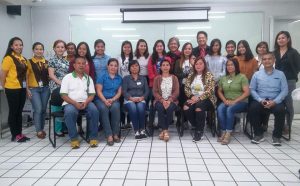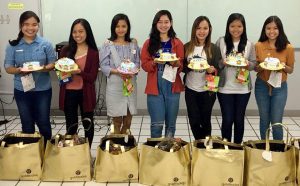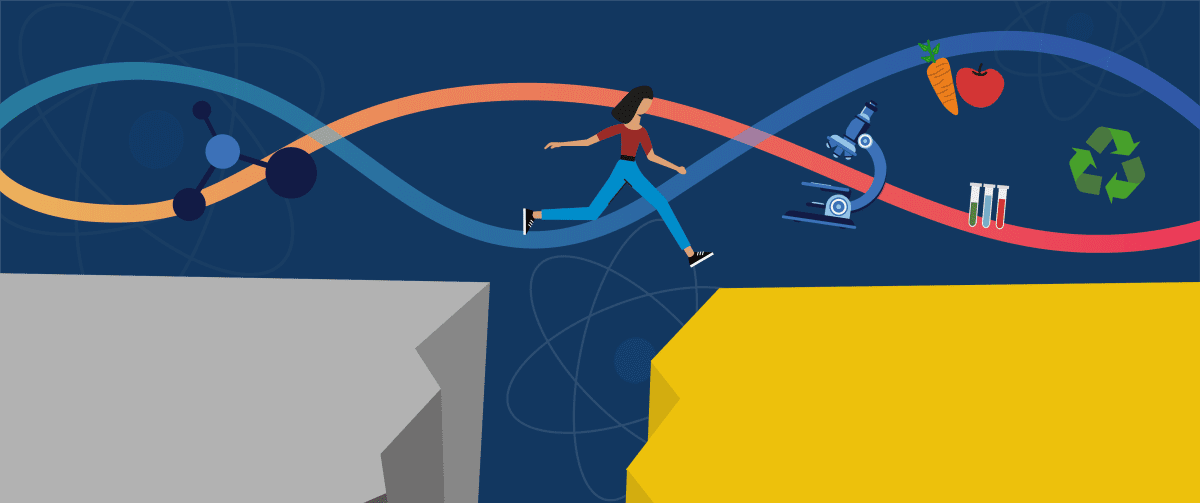by Bella Angela Del Rio
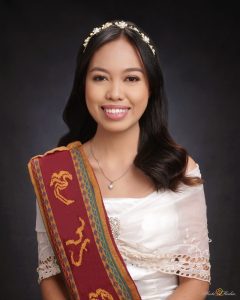
May Lara Bea Labayog, or as many call her “Bea,” is a 22-year-old, currently studying at the University of the Philippines – Diliman (UP Diliman) as a BS Food Technology student. Before studying at UP Diliman, she dreamed of becoming an astronaut but was not confident when it came to math and physics so her dreams of becoming an astronaut were quite far from her skillset, which made it difficult to decide what major she would take up in college.
She had a love for science, mainly biology, chemistry, and technology, where she saw theories and lessons learned being applied. So she began to search for courses that she could take related to her fields of interest. There were several concepts on food chemistry, food microbiology, and food engineering when she checked the curriculum for BS Food Technology in UP Diliman which intrigued excited her and challenged her to learn more about these subjects.
“What was a bonus for me during our Introduction to Food Science and Technology class (FS 101), our prof showed us a video of food scientists involved in making food for astronauts from NASA. So in a way, it’s kind of near to my original dream of going into space. The reason I stayed and continued my Food Technology studies become different and more clear as I go on and learned a lot about my society and the food system in our country. Now it was to stay here on earth and try to leave it a little better for the next generation,” said Bea.
Challenge #1: Surviving College Life
Bea’s journey as a student and as a young person was not easy. She was the breadwinner of her family who had to take on other responsibilities for her to survive as a student and make ends meet at home. During her freshman year, Bea was a scholar under a different scholarship program that offered her financial support of Php 5,000 per month which was not enough to cover her expenses. Bea paid for her own dorm rental near UP worth Php 2,500, almost half of her stipend, and the rest were spent on meals, transportation, and class materials which required her to take on part-time jobs. Alongside these, she had to send home money for her family and managed to juggle all these with her classes and assignments.
“My father taught me to decide for myself. He emphasized that I shouldn’t be afraid of taking on risks, challenges, and exploring more,” Bea explained.
With this in mind, and being the resourceful student she is, Bea tried to look for other opportunities to receive financial assistance to ease the burden and lighten the weight on her shoulders. She went to the Office of Scholarships and Grants (OSG) in her university and sent applications to the different available scholarship programs. She came across the PhilDev Foundation Scholarship Program in partnership with Goldilocks that was providing scholarships for FoodTech students like her and thought to herself that there was nothing to lose if she attempted to sign up. Thankfully, Bea managed to get into the program and is one of our most active scholarship recipients.
“Their support went beyond financial assistance, and that is why I chose to become a PhilDev scholar. Coming from a low-income household, I am grateful for the financial assistance I have been receiving, but it is the moral support, guidance, understanding, belongingness, and capacity-building programs which PhilDev provided for its scholars that allowed me to grow and realize my potential,” said Bea.
Scholarship programs are more than just providing financial support. Students also need other kinds of support, in terms of leadership training, counseling, career guidance, and networking, in order for them to thrive in their academic life and still enjoy their student years without having to worry if they have enough to pay for their next meal or enough to support themselves and their families.
Challenge #2: Getting Connected and Adapting to the Pandemic
“It felt refreshing to be part of the PhilDev Science and Engineering Scholarship Program (PSES). PhilDev was not just providing support but they also believed in me. What I loved the most was the counseling and mentorship sessions because they made me feel empowered and happy. Even if I was not really connected to my mom, Miss Claude, Miss Zen, Miss Aimee, and Miss Bernie [PhilDev staff] became the mother figures in my life. There were moments where I’d doubt myself, “Am I doing this right? Can I still do this?” And PhilDev was there to encourage me to believe in myself,” said Bea.
Through PhilDev and Goldilock’s scholarship program, Bea shared how she was able to connect and meet with other scholars who came from different backgrounds. Activities such as the annual leadership summer camp made her feel that she was part of something bigger. She highlighted how PhilDev x Goldilocks and the other scholars became a support system to her.
Transitioning into the pandemic was one of the toughest things Bea and our scholars had to go through, but with the help of the Intel Filipino Employee Network (IFEN) and her mentor, Ms. Therese Kinney, under the MULAT (Mentorship and Uplifting the spirit of young Leaders and Aspiring Trailblazers) program, Bea shared how she was able to talk about her struggles, worries, and experiences, and also received insights from her mentors at IFEN on how to overcome these challenges.
Challenge #3: Applying Technical Knowledge Out in the World
Outside the university, Bea is also actively participating in youth-led activities and programs. Currently, she volunteers at the 2030 Youth Force in the Philippines and is the Project Director of Filipino Patriot Scholars Project – Health Sector under the Department of Science and Technology – Science Education Institute which entails managing DOST scholars nationwide in implementing projects on clean water and sanitation, malnutrition, and awareness campaigns for public health.
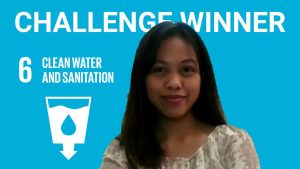 Through an opportunity shared by PhilDev, she was one of the challenge winners in the How to Change the World program, winning best Implementable Project for UN SDG 6: Clean Water and Sanitation. The problem that they had to solve as a team was “big and required a lot of collaboration.” Being the only Filipino in her group, it was a huge learning experience where she had to “step out of her bubble,” she said. Bea explained how she loved taking on opportunities like this because she learned of the many lessons she learned along the way, such as the importance of collaboration, communication, and listening to various stakeholders and experts. Joining these programs also inspires her to create a larger impact in the world.
Through an opportunity shared by PhilDev, she was one of the challenge winners in the How to Change the World program, winning best Implementable Project for UN SDG 6: Clean Water and Sanitation. The problem that they had to solve as a team was “big and required a lot of collaboration.” Being the only Filipino in her group, it was a huge learning experience where she had to “step out of her bubble,” she said. Bea explained how she loved taking on opportunities like this because she learned of the many lessons she learned along the way, such as the importance of collaboration, communication, and listening to various stakeholders and experts. Joining these programs also inspires her to create a larger impact in the world.
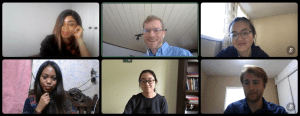 Bea and her team’s pitch was to make water resources in Nepal accessible and ensure that these resources are utilized efficiently. This is done by taking a two-way approach, involving the grassroots stakeholders in developing the solution through a social information and awareness campaign, and incorporating a solar-powered distillation system that decontaminates freshwater in the community. Based on their findings, access to clean water was not a priority for the stakeholders in the community, which is why they devised a more affordable and home-based solution, a solar distillation system.
Bea and her team’s pitch was to make water resources in Nepal accessible and ensure that these resources are utilized efficiently. This is done by taking a two-way approach, involving the grassroots stakeholders in developing the solution through a social information and awareness campaign, and incorporating a solar-powered distillation system that decontaminates freshwater in the community. Based on their findings, access to clean water was not a priority for the stakeholders in the community, which is why they devised a more affordable and home-based solution, a solar distillation system.
[READ MORE: Team 4-G – Water Treatment in Biratnagar]
Other teams pitched several innovations and solutions during the competition. It was a tough challenge to go through. What Bea liked most about the competition was how they were taught to focus on defining the problem before solving it. In design thinking, we hear the common phrase, “define the problem,”. Bearing this in mind, Bea shared that “in order to create a larger impact, we have to empathize with our stakeholders.” Empathy is a crucial step in understanding where the community is coming from in order to craft evidence-based solutions that are anchored on the needs of the community.
Challenge #4: Extending a Hand within a Community
During the height of the COVID-19 pandemic, community pantries were booming in the Philippines, it was a trust system where donors give what food they can offer and individuals take only what they need. Last May 4, Bea was empowered to do the same. She started a community pantry in her neighborhood and after several weeks of running the pantry, she managed to help almost 70-100 families in every operation.
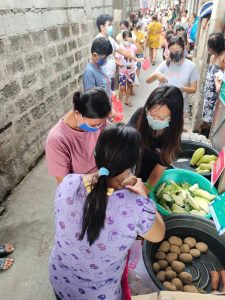 .
. 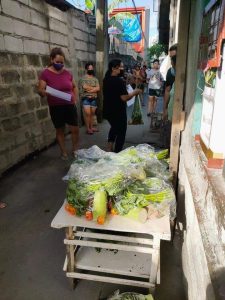
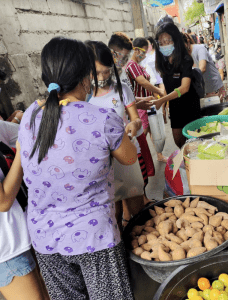
“What I did differently was I tried to understand my demographic in our neighborhood. Using an informal survey, I identified different factors such as age, income, household structure, and food intake. The results were able to show which who are we helping, how we are helping them, and how can we help them further. Having this information made me understand my stakeholders better,” says Bea.
Bea will soon be graduating from college this September 2021. As she waits for graduation day to come around, she is working as a Junior Consultant at the Food Technologists Support where she gets the chance to work with various industry experts and assist micro, small and medium enterprises (MSMEs) in developing food products and improving their food safety management systems.
Challenge #5: Looking at the Future Ahead
After graduating from college, Bea wants to be in the field of community development, public management, food policy, or policymaking. She sees a huge potential for agriculture in the country to further scale, but the current systems need to be improved and managed better. Currently, Bea is at the crossroads of choosing to start a social enterprise and being part of the development sector, but most definitely, she wants to be able to contribute and do something that addresses social issues. Today, Bea is searching for job openings specifically in agriculture or in social entrepreneurship so that she can give back to the Filipino community. She is also eyeing to take Women and Development studies either in the Philippines or abroad.
“I want to give back the support I received by helping other people. My degree program in Food Technology is under the Department of Food Science and Nutrition, College of Home Economics and we focus on supporting Filipino families and consumers. These are the values that I have learned and are still the values I carry with me now. “How can we improve the lives of Filipino families as food technologists?” This is my big question and what fuels me to become a Filipino food technologist that I will be proud of someday,” Bea shared.
Bea is one of our scholars who are breaking barriers for young people and is showing how she is able to create an impact in her school and outside the classroom.
“To PhilDev and Goldilocks, thank you for all the opportunities! It is very taxing to think about my academics and various responsibilities, but because of PhilDev who helped me focus on my studies, and Goldilocks who provided a laptop for me, I am capable of grabbing so many more opportunities.
To my fellow scholars, grab these opportunities. My dad really taught me how to take on challenges and risks, but there is so much fear in doing so. What makes it less terrifying to take these risks is the confidence that someone supports you, win or lose. There’s a lesson to be learned either way–most especially when you fail. Then we can always try again. And one of the things I learned from my PhilDev family is how to get back up and try again. They gave me the courage to take such challenges and risks,” says Bea.
